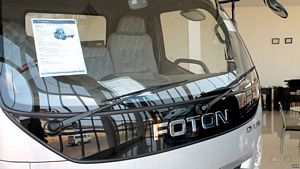|
By accessing or using The Crittenden Automotive Library™/CarsAndRacingStuff.com, you signify your agreement with the Terms of Use on our Legal Information page. Our Privacy Policy is also available there. |

Chinese Factory Tries to Sell Trucks to Wary Ugandans
|
|---|
|
|
Chinese Factory Tries to Sell Trucks to Wary Ugandans
Hilary Heuler, VOA News
24 June 2013 (1:23PM)
 A truck on display at Foton's showroom in Kampala, Uganda, where the Chinese company plans to open a manufacturing plant, June 20, 2013. (VOA News - H. Heuler) A truck on display at Foton's showroom in Kampala, Uganda, where the Chinese company plans to open a manufacturing plant, June 20, 2013. (VOA News - H. Heuler)
|
KAMPALA — A Chinese company has plans to build Uganda's first auto manufacturing plant, a move that could boost industry in a country that has always relied on more expensive imports. But carmaker Foton must first overcome Ugandans' profound suspicion of Chinese products.
African roads have traditionally been plied by second-hand cars, some in appalling condition. But a Chinese company, Foton, has set out to change that. Earlier this month, the company announced that it would be building a new manufacturing plant in Uganda, with plans to export Ugandan-made cars to neighboring countries.
Foton already operates a similar plant in Kenya, but for Uganda this would be a first. Until now, Ugandans have always relied on expensive imported brands like Toyota. The Chinese plant would focus on producing light industrial vehicles like pickup trucks, churning out around 300 per month. According to Foton, they would be up to $6,000 cheaper than imports.
Such vehicles have the potential to stimulate Ugandan businesses, said Denis Dokoria of the Uganda Industrial Research Institute.
“Transport has always been a very big challenge," he said. "You may have your product, but how do you get it down to the consumer? So if there are affordable vehicles, then I think it would do fine.”
But the question is, will they sell? Uganda is already awash in Chinese products, and not all have proven popular. Some, like the Chinese Jincheng motorbike, are significantly cheaper than their competitors. But many Ugandans do not trust them.
Victor Apuwle drives a boda-boda, or motorbike taxi, in Kampala. He explained why most Ugandan boda-boda drivers scorn the Chinese bikes, buying more expensive Indian models instead.
“They are not trusting them because of their durability," he said. "Here in Uganda, if you tell someone the products are coming from China, they say, ‘ah, that one is the fake one.’ There are those good things which come from China, but for now, they can say they have spoiled their name.”
Justin Hu, a manager at Foton East Africa, is well aware that his customers are likely to be wary. He said, “First they are afraid to buy Chinese products, because they don’t understand most of them. That’s why many companies they need to try [them] first.”
But Hu admited that unfamiliarity is not the only problem. In terms of quality, Foton cannot compete with Japanese or European imports, he says. To compensate, the company is offering to service vehicles when they break down.
“We don’t say our vehicle is stronger than German Mercedes Benz or Toyota," he said. "We cannot, because we’re still developing. But one thing we guarantee is, we bring you a new concept of after-sale service, to help you to solve your problems.”
Foton is still negotiating with the Ugandan government, and it could be several years before the plant is up and running. But Hu is confident that it will get the political support it needs, for the sake of Ugandan industry.
“For a country to develop, industry is very important," Hu said. "For Uganda, the government wants their country to progress. After we are established here, we are sure most of the local companies will accept the new concept from our company to progress, to compete with the international market.”
But, Dokoria said, Uganda business owners are discriminating customers, and price is not their only consideration.
“If the vehicles are not working well, if they are not durable, then definitely people will shun them," he said. "Why would I buy a something like a vehicle, and it breaks down within one year? Why not spend a little more, and have something that will last a little longer?”
Ultimately it is the vehicles themselves, he says, that will determine whether or not the Chinese investment pays off.



















 Topics: Foton
Topics: Foton
 A truck on display at Foton's showroom in Kampala, Uganda, where the Chinese company plans to open a manufacturing plant, June 20, 2013. (VOA News - H. Heuler)
A truck on display at Foton's showroom in Kampala, Uganda, where the Chinese company plans to open a manufacturing plant, June 20, 2013. (VOA News - H. Heuler)
